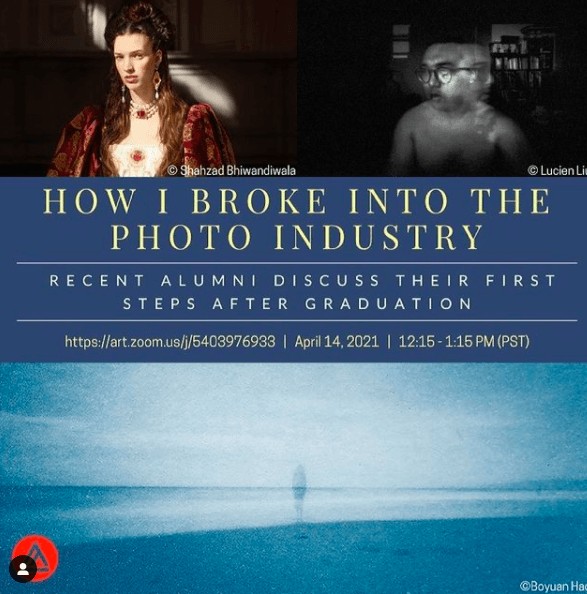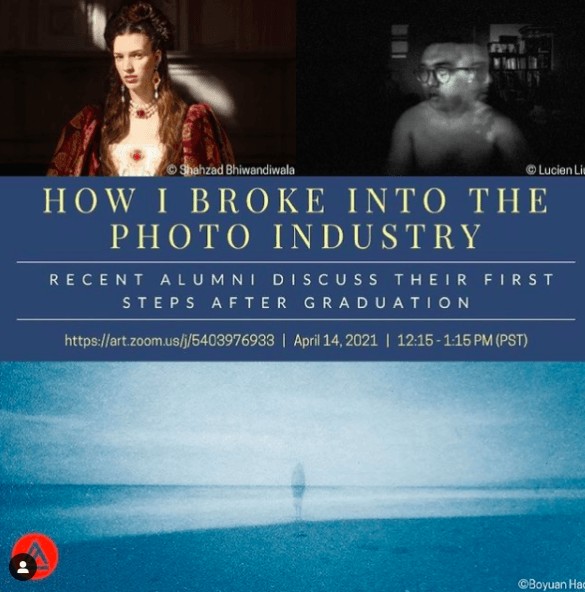By Greta Chiocchetti
Though graduating on the cusp of the COVID-19 pandemic posed a unique challenge for students across the globe, Academy of Art University alumni have the tools to forge a creative path despite the obstacles. In a Zoom panel moderated by School of Photography Associate Director Timothy Archibald this past April, three recent graduates spoke about their first steps, including networking both in-person and online, starting a freelance career, and finding opportunities amidst a global pandemic.
“I’m a big believer that that first year when you leave school is kind of the most important year—and not the most important to become famous or to become successful, but to find a way to get into your own creative flow without the structures of school and the challenges that you have to meet,” said Archibald, who moderated the alumni chat.
Boyuan Hao (2019), Shahzad Bhiwandiwala (2020), and Lucien Liu (2019)—all M.F.A. alumni—admittedly graduated at a very disadvantageous time in history.
“It’s kind of like the theme of everything I’ve done across time,” joked Bhiwandiwala, who currently freelances as a commercial and fashion photographer. “When I graduated from college actually, it was when jobs were at an all-time low, back in 2013. But it’s been interesting because it’s always taught me something. I’ve always had a takeaway.”

Though nowadays most students tend to seek out full-time roles right out of college, Archibald said, Bhiwandiwala always seemed to have his sights set on building a robust freelancing career.
“I would definitely be interested in getting a [full-time] job, but what I have realized is that the job is just for regularity. It doesn’t have to be the most interesting job,” said Bhiwandiwala. “After graduation, I did apply to many places but couldn’t join them full-time while I was still in school and due to visa restrictions, and a few were [only] willing to pay me the princely sum of $20 an hour. So, I said, ‘No, thank you, I’m worth a lot more than $20 an hour.’ I had to turn those down. At some point, you need to know your own value. My long-term goal is to freelance, so I don’t want something on my CV that brands me as someone who will take work on the cheap or who would be willing to just work for the heck of working. That prevented me from taking the easiest or the first offers I got.”
After graduation, Hao lined up a series of creative pursuits, including a tintype photography workshop at Image Flow. She was also accepted into Kala Art Institute in Berkeley, where her art was in residency for a few months while working full-time as a photo assistant at the RealReal.
“I was fresh out of school when they hired me and didn’t have any work experience in photography, but I think they thought I would take it more seriously because of that, which I did,” said Hao. “They did group interviews for that hiring process, and there were photographers with more experience, but they chose me. I think they were looking for some fresh people.”
For Liu, who graduated two months before the pandemic hit, lockdown offered time to get his priorities in order—before a chance meeting led to his first big industry break.
“I knew that if I wanted to do fine art, especially in another country, it would require time,” said Liu, who works as a manager at PhotoAlliance as well as a curator at San Francisco Artists Alumni. “It took me about six months to figure out my path. First, [I] was working on my visa, so I could stay and work here, then getting into more exhibitions, then getting a job. But it turned out to be very lucky—I got into a PhotoArts exhibition last year and was able to network and was introduced to Linda Connor, who brought me to PhotoAlliance, where I am now.”
Bhiwandiwala said that his time at the Academy taught him the importance of networking. “The one thing I realized the most is building your own team and having a network while in school is absolutely essential. All the jobs that I have gotten are from the network that I have built. Nothing has come in from people that I don’t know; it’s always through recommendations. It’s always through people who have worked with you who say, ‘Okay, this guy is good.’”
